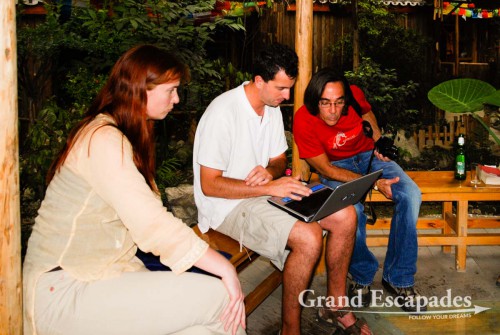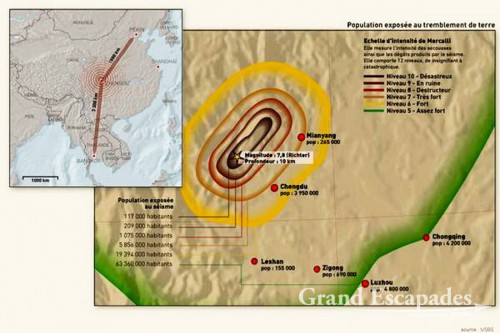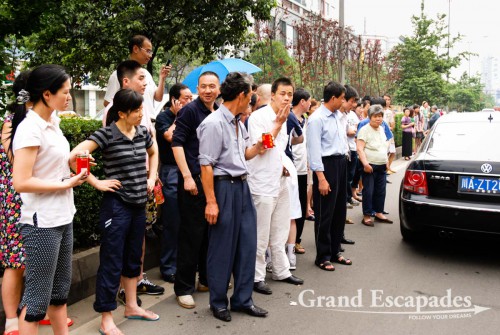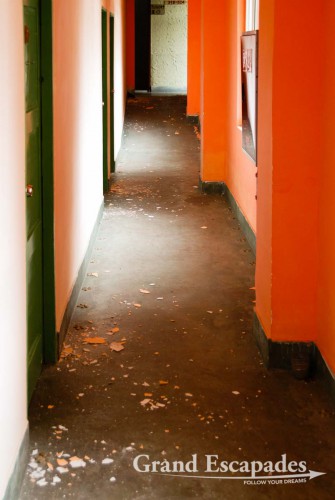Monday, May 12th 2008 – 02.28 pm
We were in Chengdu / Sichuan, 92 kilometres from the epicentre when the earthquake hit with full force Monday afternoon at 02:28 pm, with an incredible strength of 7.9 on the Richter Scale (max. is 9.0). We needed a few seconds to realize what was happening. We then rushed into a doorway to look for shelter.
What followed were probably the longest two minutes of our life. The building was shaking like mad, creaking and plaster fell from the walls. We had a full view of another building: it was swaying violently. We never thought that it would resist the tremor, but it did, apparently like most buildings in Chengdu. This metropolis of 10 millions people suffered relatively little damage, although BBC reported 45 fatalities only here. The only damage we personally have noticed are cracks in the wall of our hostel, broken windows and plaster fallen off the wall. But we have not left the area because of the indescribably traffic jam that followed the quake. Everybody poured into the streets, including us!
At this point, we had no idea about the whole disaster and actually a lot of people here did not seem very concerned. Drivers angrily rushed by those people who tried to get away from the buildings and waited in the middle of a six lane main road. Others, in buses, were using their mobiles to take photos of us squeezed against the hedge separating this road.
After two “minor aftershocks” of 6.0 and 5.4 (!), we dared to go back inside, where soon the whole tragedy unfolded. Since we were online when the earthquake hit, we still had our laptop, so from the garden of the hostel we accessed the Internet. Within minutes we knew (1) of the enormity of the tremor, (2) how close the epicentre was, only 90 kilometres northwest, which seemed so terribly close then and (3) of the fact that it was a shallow earthquake, with specialist calling it a potentially very dangerous one!

At Sim’s Cozy Backpackers, after the Earthquake in Chengdu, on May 12th, 2008, at 14:28 – 7.9 on Richter Scale!
Especially after BBC and CNN reported that the tremor was felt not only in Beijing, but also Hanoi (Vietnam) and Bangkok (Thailand, 3.300 kilometres away), we assumed that we must have been right in the middle of it and got off easily. The radio in Chengdu initially only talked about the traffic jams, but after two hours there was TV footage. It showed people hiding under desks and running outside. The earthquake was on the news all evening, but since there were no photos or films from the worst hit areas, Wen Chuen and Du Jiang Yan, we had not idea what was going on.
These places are only 50 to 90 kilometres away from us. Eventually, we stopped asking the staff what is being reported: they were as disturbed as we were and many could not contact their families because the phone lines were down, since so many people were calling or trying to call.
Gilles reacted swiftly to the first BBC report online and described briefly what we experienced. He did not imagine that this small contribution led to two interviews via telephone, one being broadcast live on the radio at 11:00 am C.E.T.
Only later at night, first news reached us about the extent of the disaster, with the death toll rising by the minute. Since early Tuesday morning, the Chinese TV brings heartbreaking images, soldiers pulling little children from the rubble, covered in dust. The details we know only through western media, again we cannot expect that the employees standby to translate for us.
In the meantime, BBC talks about 10.000 people killed and many still buried. We still have difficulties to comprehend that “only” 50 kilometres made such a difference: from going “only” through a two-minute horrid scare to being killed or buried alive, like the 900 school children! To makes things worse, the road to these two places is inaccessible and during the night it started to rain, which makes all rescue efforts even more difficult.
The Chinese government reacted with surprising openness and swiftness: the army was immediately sent to the area and help from outside is welcome. There is no doubt to us that the Chinese government will do anything in their power to show the world that right before the Olympic Games, they can cope with such situation.
The night was not quiet either. We were told in the evening that an aftershock was to be expected between 08:00 and 11:00 pm local time, but nothing happened, so around 12:30 am, many decided to call it a night…Only to run into the street again at 04:20 am when we were woken by another strong quake!
By then it had started to rain and people sat on the roadside, with umbrellas and their pets. Many, especially elderly people, have spent all night outside, fearing the aftershocks.
Monday airport, bus and train service were suspended but we hope that we can fly to Lijiang as we had planned Tuesday in the afternoon…




No comments yet.